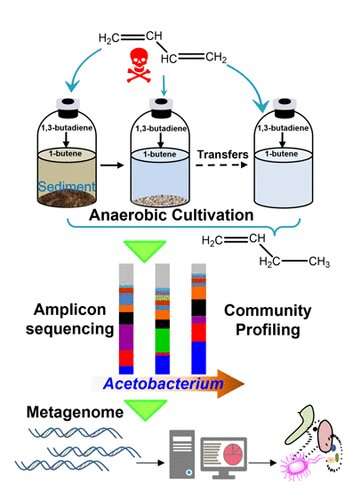Graphical abstract. Credit: Environmental Science & Technology (2023). DOI: 10.1021/acs.est.2c05683
1,3-butadiene (BD) is widely used in the production of rubber, thermoplastic resins and nylon. Long-term exposure to BD-contaminated environments can cause eye pain, blurred vision, coughing and drowsiness, and increase the incidence of leukemia. The International Agency for Research on Cancer has classified BD as a class one human carcinogen. Therefore, elucidating the process and mechanism and microbial transformation of BD may help to properly assess its environmental risk.
Yang Yi and Yan Jun from the Institute of Applied Ecology of the Chinese Academy of Sciences have established an anaerobic BD biotransformation microcosm using river sediment as an inoculation source. They found that in the microcosmic system BD underwent a hydrogenation reaction and was rapidly converted to 1-butene with concomitant acetate production and a growing population of Acetobacterium.
The researchers assembled a 94% complete Acetobacterium genome map through metagenomic sequencing and bioinformatics analysis, and found that the dominant Acetobacterium population was a new strain of the species A. wieringae, designated as strain N.
The strain N genome contains several genes encoding flavoprotein oxidoreductases and short-chain dehydrogenases/reductases, and the researchers believed that these genes may be involved in the anaerobic biohydrogenation of BD.
This study demonstrates for the first time the importance of Acetobacterium in BD conversion. In addition, the researchers suggest that mining the hydrogenase-related genes may provide a new route for the development of efficient biocatalysts for the industrial conversion of BD to 1-butene.
This study was published in Environmental Science & Technology.
More information: Yi Yang et al, Biohydrogenation of 1,3-Butadiene to 1-Butene under Acetogenic Conditions by Acetobacterium wieringae, Environmental Science & Technology (2023). DOI: 10.1021/acs.est.2c05683
Journal information: Environmental Science & Technology
Provided by Chinese Academy of Sciences
























